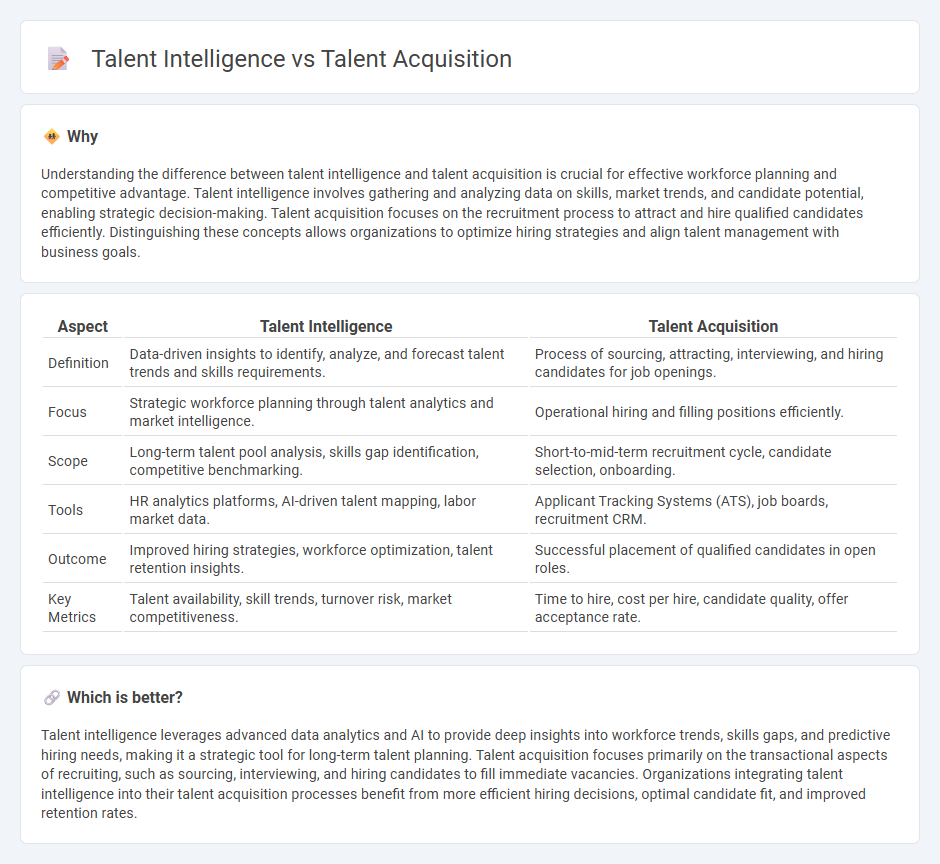
Talent intelligence leverages data analytics and AI to identify workforce trends, skill gaps, and potential candidates, enhancing strategic hiring decisions. Talent acquisition focuses on sourcing, attracting, and onboarding qualified individuals to meet immediate organizational needs. Explore how integrating talent intelligence transforms traditional talent acquisition for more effective employment outcomes.
Why it is important
Understanding the difference between talent intelligence and talent acquisition is crucial for effective workforce planning and competitive advantage. Talent intelligence involves gathering and analyzing data on skills, market trends, and candidate potential, enabling strategic decision-making. Talent acquisition focuses on the recruitment process to attract and hire qualified candidates efficiently. Distinguishing these concepts allows organizations to optimize hiring strategies and align talent management with business goals.
Comparison Table
| Aspect | Talent Intelligence | Talent Acquisition |
|---|---|---|
| Definition | Data-driven insights to identify, analyze, and forecast talent trends and skills requirements. | Process of sourcing, attracting, interviewing, and hiring candidates for job openings. |
| Focus | Strategic workforce planning through talent analytics and market intelligence. | Operational hiring and filling positions efficiently. |
| Scope | Long-term talent pool analysis, skills gap identification, competitive benchmarking. | Short-to-mid-term recruitment cycle, candidate selection, onboarding. |
| Tools | HR analytics platforms, AI-driven talent mapping, labor market data. | Applicant Tracking Systems (ATS), job boards, recruitment CRM. |
| Outcome | Improved hiring strategies, workforce optimization, talent retention insights. | Successful placement of qualified candidates in open roles. |
| Key Metrics | Talent availability, skill trends, turnover risk, market competitiveness. | Time to hire, cost per hire, candidate quality, offer acceptance rate. |
Which is better?
Talent intelligence leverages advanced data analytics and AI to provide deep insights into workforce trends, skills gaps, and predictive hiring needs, making it a strategic tool for long-term talent planning. Talent acquisition focuses primarily on the transactional aspects of recruiting, such as sourcing, interviewing, and hiring candidates to fill immediate vacancies. Organizations integrating talent intelligence into their talent acquisition processes benefit from more efficient hiring decisions, optimal candidate fit, and improved retention rates.
Connection
Talent intelligence leverages data analytics and insights to identify skill gaps and predict future workforce needs, enhancing the strategic approach to talent acquisition. Talent acquisition uses this intelligence to target candidates with the right skills and cultural fit, improving hiring efficiency and reducing time-to-fill. Integrating talent intelligence with acquisition processes drives informed decision-making and optimizes workforce planning for sustainable business growth.
Key Terms
Recruitment (Talent Acquisition)
Talent acquisition focuses on sourcing, attracting, and hiring top candidates to fulfill organizational needs efficiently, using strategies like employer branding and targeted job advertising. Talent intelligence involves analyzing workforce data and market trends to enhance recruitment strategies, enabling predictive hiring and better talent forecasting. Explore how integrating talent intelligence can revolutionize your recruitment process for improved hiring outcomes.
Data Analytics (Talent Intelligence)
Talent acquisition relies on sourcing, attracting, and hiring candidates, while talent intelligence leverages data analytics to uncover insights about workforce trends, skill gaps, and predictive hiring outcomes. Talent intelligence uses advanced analytics tools to transform raw employee and market data into actionable strategies for optimizing recruitment and retention. Explore how integrating talent intelligence can revolutionize your hiring approach and business growth.
Workforce Planning
Talent acquisition centers on sourcing, recruiting, and onboarding candidates to fulfill immediate workforce needs, while talent intelligence employs data analytics and market insights to forecast future workforce requirements and skills gaps. Workforce planning benefits from integrating talent intelligence to create proactive strategies that align organizational goals with evolving talent landscapes. Explore how leveraging both approaches can optimize your workforce planning for sustained organizational success.
Source and External Links
Talent Acquisition: The Ultimate Guide - AIHR - Talent acquisition is the process of identifying, attracting, selecting, and retaining highly qualified people, built around strategies like Build, Buy, Borrow, and Bridge to meet organizational goals.
What is Talent Acquisition? Tips & FAQs - SmartRecruiters - Talent acquisition involves planning, employer branding, managing candidate life cycle, and aligning hiring strategies across departments to attract and retain skilled workers.
What Is Talent Acquisition and How Does It Work? | Paycom Blog - Talent acquisition encompasses processes and strategies such as talent forecasting and pipelining, designed to hire and retain employees that support long-term business objectives.
 dowidth.com
dowidth.com